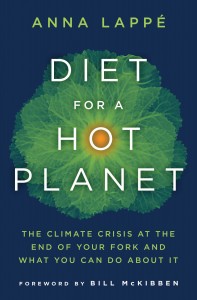Urban Chickens, Rooftop Farms, and You
Posted in Exhibitions, The Edible Garden on August 11 2010, by Plant Talk
What Do These Have to Do with Helping Solve the Climate Crisis?
 |
Anna Lappé is author of Diet for a Hot Planet: The Climate Crisis at the End of Your Fork and What You Can Do About. She will give a talk at the Garden as part of The Edible Garden’s Food for Thought series on August 19 at 7 p.m. |
 A few nights ago, I watched the sky darken over the East River while I listened to clucking chickens peacefully pecking on the roof of a loft in Greenpoint, Brooklyn. Eagle Street Rooftop Farm is just one of the rooftop farms sprouting up across the city, bringing to communities fresh food and the opportunity to get our hands in the dirt.
A few nights ago, I watched the sky darken over the East River while I listened to clucking chickens peacefully pecking on the roof of a loft in Greenpoint, Brooklyn. Eagle Street Rooftop Farm is just one of the rooftop farms sprouting up across the city, bringing to communities fresh food and the opportunity to get our hands in the dirt.
Eagle Street, all 6,000 square feet of it, has only been around two growing seasons, but it already boasts a loyal following. A dozen families are members of its CSA; hundreds of kids have munched on its peppers and tomatoes; and from 40 to 65 volunteers a week have dug in its raised beds. The place is buzzing with life and, the day I was there, newborn rabbits, who earn their keep with droppings used for fertilizer.
Eagle Street is just one of the reasons I’m not feeling so blue these days. In the face of mounting environmental catastrophes—from global climate change to a dead zone in the Gulf of Mexico that swells to the size of New Jersey every year—there’s a lot to feel depressed about. These crises can feel far removed from our daily lives and from our control. But with every choice we make about where get our food, how we support sustainable solutions in our cities, we are helping to heal the climate.
Globally, our food system—from seed to plate to landfill—is responsible for as much as one third of all greenhouse gas emissions, primarily because of the over-reliance on petroleum-based chemicals, agribusiness-driven deforestation, and intensive livestock production.
And rooftop farms are just one example of community-based agroecological solutions that are helping to redefine the food system, from Greenpoint to Grenoble, Hartford to Hanoi.
Like organic farms and community gardens, rooftop farms are all about building a biodiverse, resilient food system—just what we’ll need in the face of the climate crisis, which is bringing us ever-more erratic weather. We also know that sustainable food systems can reduce emissions from the farm. First, sustainable farming methods lessen our dependence on fossil fuels to grow our food. Second, these methods help build healthy soil, which is better able to store carbon and acts as a “carbon sink.” Third, these local sources of food shorten the distance between farm and plate, reducing the “food miles” associated with every bite we eat.
Want to support a climate-friendlier food system? Here are some ideas.
- Eat closer to the source: Get food directly from farmers through a farmers market or CSA, like the one at Eagle Street. Find a CSA in your New York City neighborhood at www.justfood.org.
- Reach for Real Food: Buy the ingredients, not the processed final product; it’s better for you and the planet. Find tips for healthy eating and a plethora of recipes at Eat Well Guide.
- Dig in the dirt: Connect with your local botanic garden, community garden, or urban farm. Learn techniques for being a climate-friendlier gardener with this guidebook from the Union of Concerned Scientists.
- Educate the next generation of eaters: When we’re kids, our tastebuds are shaped for a lifetime. Teach your kids and kids in your community about the pleasures of eating real food, and help them discover the sources of their food by taking them to local gardens and farms. Build a respect for our meals by dining at the table together. Get inspired at the Center for Ecoliteracy.
- Speak up: Add your voice to the many calling for federal support for sustainable food systems, not oil-dependent ones, and community food systems. Check out the National Sustainable Agriculture Coalition’s Web site to learn more.
Come hear Anna Lappé talk on August 19 at 7 p.m. at The Edible Garden’s Food for Thought, featuring the Waterlily Concert Series. The presentation will be followed by live bluegrass music. Tomorrow’s segment of the series (August 12) features jazz music.

